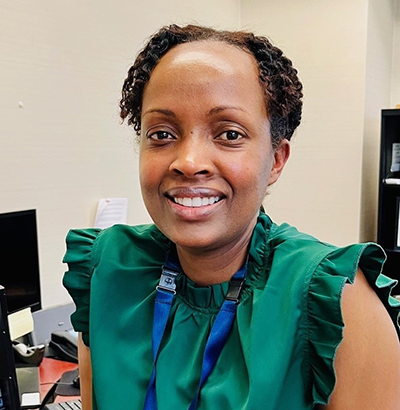Faces of CSC: Alima Prime


“I always wanted to work within the criminal justice system. After I finished my degree, I faxed my resume over to Edmonton Institution, the maximum security prison for men. They called me to pick up a package to study for a primary worker position at Edmonton Institution for Women (EIFW).”
Alima studied, wrote the exam, had an interview, and did three months training in Saskatoon, before starting at EIFW as a primary worker (correctional officer) in 2006.
“I didn't know much about corrections, so it was a big learning curve. I had some good officers who I could follow and learn from.” She also enjoyed the interaction with the women on her case load, assisting them with their reintegration.
After working at EIFW for three years, Alima became the first community security intelligence officer, covering the Alberta and Northwest Territories Parole District. She was one of only three community security intelligence officers across the Prairie region.
From 2009 to 2013, she worked closely with CSIS, RCMP, and the Edmonton Police Service sharing information that helped Correctional Service Canada (CSC) operations. She went on to be acting director at the minimum security Grierson Institution, a parole officer in the community, and project lead with the women's portfolio at National Headquarters.
In 2022, she became an area director at the Edmonton Parole Office, managing parole officer supervisors, staffing, contracts, finance, and other case management related details. Alima achieved this while having three children under the age of eight.
“A work-life balance is important to me. I have a supportive team of managers. They understand if I have to go pick up a kid or work from home because my child is sick,” said Alima. “I think it is important especially for women not to feel that they cannot be managers if they have young children.”
Alima credits her success to the people she has worked with. Her managers, district directors, and female mentors have advocated for her and played a key role in helping her get where she is. Her career has not been without discrimination and challenges. People have made inappropriate comments about hiring practices skewed towards visible minority, gender diversity, and physical ability.
“It was really just pure ignorance, honestly,” she noted.
One of my biggest motivations to become a manager is what I can do to affect positive change. Now I am at a level where I can make decisions—in consultation with our teams and staff— that would benefit others. The work we do in CSC is very important and I do not lose sight of that as a manager.
Alima said you make change with the people that you hire. Hiring the same people does not lead to change in culture, but a diversity of people does. Alima noted that CSC is making positive changes. It is part of what inspires her to come to work.
“I like to be able to contribute to a positive workplace. If I get to a point where I feel like I'm not affecting any more positive change, then I’ll need to find something else.”

